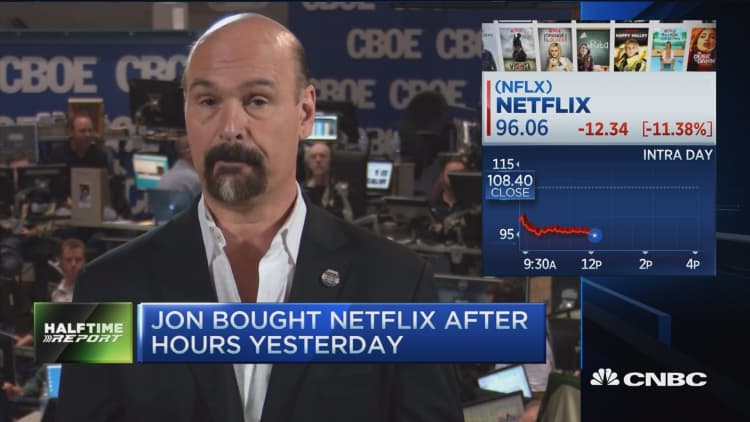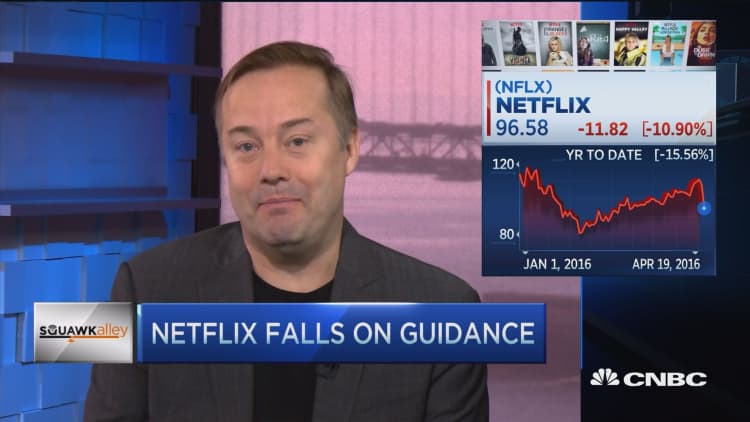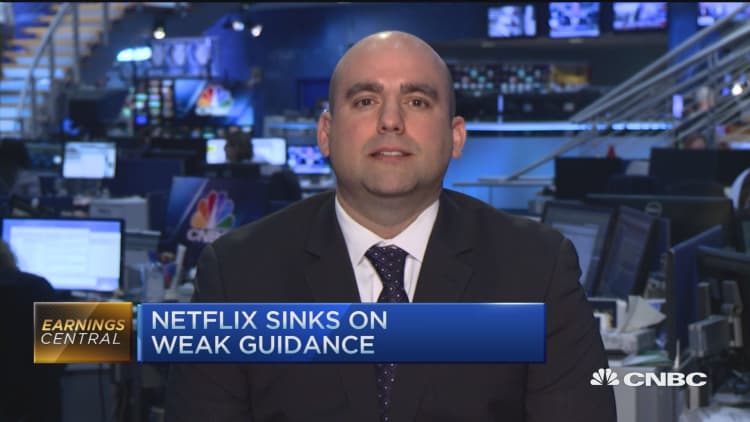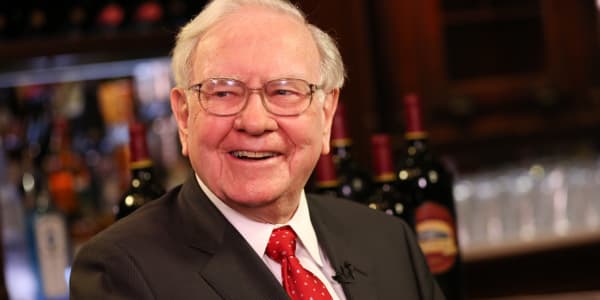Netflix shares are getting slammed Tuesday, but the smart money might be getting ready to binge on the streaming media company's shares.
Analysts say the situation at Netflix is not all that bad and suggest the 10-percent-plus drop since Friday's close may be the latest of many post-earnings buying opportunities. If you don't trust Wall Street analysts, consider Carl Icahn, who once made billions on his well-timed trade after mass hysteria about Netflix's future.
Netflix reported after Monday's close that it beat analysts' projections for first-quarter profit, earning $27.7 million, or 6 cents a share, as sales rose 24 percent to $1.96 billion, narrowly missing forecasts of $1.97 billion. But what got the market's attention was a cut in Netflix's second-quarter guidance for new-customer signups outside the United States. Instead of the 3.4 million new non-U.S. customers the market expected, Los Gatos, California-based Netflix told investors to expect about 2 million, on a base of 34.5 million internationally and 81.5 million, including Americans.
But Wall Street analysts are telling clients that this is a Netflix movie we've seen before: The challenges of forecasting the growth in Netflix's business have always led to booms and busts in the shares.
"While many investors may consider bailing on the Netflix story today (which reminds us of the investor narrative in October 2014, as the stock was plunging following [third-quarter]), we continue to believe Netflix is on track to pass 100 million subscribers globally in early 2017 and reach 150 million subscribers globally by the end of 2020," BTIG Research analyst Rich Greenfield wrote in a blog post. "If anything, Netflix's success in driving penetration in the most competitive media market in the world, the U.S., strengthens our confidence in their ability to execute globally."
That 21 percent 2014 drop isn't the only one. Netflix also dropped 23 percent after the second quarter of 2010's earnings came out. And they were hit hard during the market's bout of fear about junk bonds and China last fall, losing more than a third of their value and touching bottom at $79.95 on Feb. 8.
Icahn made an estimated $2 billion fortune playing this Netflix trade, buying in at a $58 low (pre-stock split) in 2012, after its plans to go international and sacrifice profits for global expansion led to a major pullback in shares. He sold the last of the roughly 5.5 million shares he had acquired last year.
The progress of Netflix's business has been much steadier and will continue to be, argued RBC Capital analyst Mark Mahaney. He said shares can double from here by 2019 — his 12-month target price is $140 — as annual profits reach $10 a share.
"There were fundamental negatives here. But we believe they are likely to be timing-related," Mahaney wrote. "We continue to believe that Netflix's value proposition has universal appeal — as demonstrated by its success in North America, Latin America and Western Europe."



Mahaney echoed an argument Netflix CEO Reed Hastings made in a video interview Monday evening — that Netflix's expansion in Asia is going slower than forecast, in part because nearly all of its content is in English and its payment systems rely on internationally known credit card systems, like Visa and MasterCard.
"In most of those countries, we've yet to see our full potential," Hastings said. "We're only in English, and only with international credit cards. Over the next couple of years, we'll see more opportunity.''
Even with the lower guidance, the pace of international customer growth for the first half as a whole will still be 30 percent higher than in 2015, BTIG's Greenfield said, in part because Netflix is entering a large number of countries at once.
The question is how profitably that can happen, and how soon. Morgan Stanley's Ben Swinburne cut his 2016 estimates for international growth but made only minor changes to estimates for next year, saying Netflix will solve its start-up problems overseas, as it has before, in markets like the United Kingdom and Brazil. The quarter is also likely to be slower than expected because the first quarter was stronger than forecast, with 600,000 of 8 million broadband homes in Australia and New Zealand buying Netflix as soon as it became available there, leaving fewer people to sign up between April 1 and June, Swinburne said.
The larger issue is that Netflix still has to prove it can make local-language original content that sells in markets across the world, he said. On the plus side, the 2.2 million new domestic subscribers in the quarter suggest that threats to Netflix from Amazon.com's Prime video service, which also has a long slate of original programs, is not dire, he said.
"Much of this year has been spent debating how rapidly the U.S. business will fade, and the [first-quarter] results have to some extent put that concern to bed," Swinburne said. "The international bear case — essentially the 'what works in the U.S. doesn't work elsewhere' concern — is back in focus."
The argument about Netflix is always about whether its growth and its reported operating profits are more important than its continual losses on the cash flow line as it spends to expand into new countries and develop its own programming. The argument resembles the one about Amazon.com, where growth usually convinces the company to redouble spending to pursue even more. And now Netflix is linked directly with Amazon.
Longtime Netflix bear Michael Pachter of Wedbush Securities raised that argument in his note today, arguing that Netflix shares are really worth only $45. Amazon is likely to boost both marketing spending for its video service and its new programming, he argued, since Amazon just announced it will offer video to customers who don't also buy its discounted-shipping Amazon Prime service.
"Content spending continues its inexorable rise, and Netflix commented that it expects at least another $1 billion growth in spending (more on a cash basis) in 2017," Pachter said. "Additionally, we think that now that it is a standalone service, Amazon Video will up the ante for acquiring new content. This creates a double-whammy for Netflix — higher content spend and slowing subscriber growth."
Netflix has overcome early problems in international markets before, especially in Latin America, bulls like Mahaney say. And the several analysts, other than Pachter, who cut price targets for Netflix Tuesday all continue to see the shares rising 15 percent or more in the next year.
"One shouldn't worry too much about quarter-by-quarter fluctuations, but NFLX shares are highly sensitive to near-term sentiment," Macquarie Securities analyst Tim Nollen said. His target is $110. "It may take a quarter or two to see a better growth trajectory."
— By Tim Mullaney, special to CNBC.com



